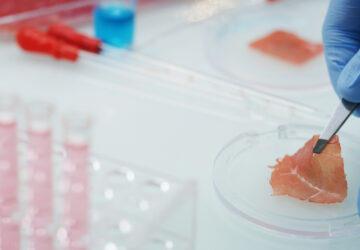 The IFC comedy Portlandia premiered last January. A sketch comedy about the “wheat-germy, hippie-ish environs of Portland, Ore.,” the show would be amiss without featuring some of the latest “foodie” trends. A two-and-a-half-minute trailer shows a couple attempting to order chicken—only to pummel the waitress with questions. Is it local? How organic is it? You get the idea. (Maybe you have a cousin like this.)
The IFC comedy Portlandia premiered last January. A sketch comedy about the “wheat-germy, hippie-ish environs of Portland, Ore.,” the show would be amiss without featuring some of the latest “foodie” trends. A two-and-a-half-minute trailer shows a couple attempting to order chicken—only to pummel the waitress with questions. Is it local? How organic is it? You get the idea. (Maybe you have a cousin like this.)
The waitress goes above and beyond to prove the restaurant’s “intimate knowledge” about the chicken, even producing a folder with a bio and photo of the exact chicken (named “Colin”) they would be eating. If this wasn’t absurd enough the couple decides to leave the restaurant and drive to the local farm to see it for themselves, resulting in a rather, shall we say, interesting experience. (You can probably find the whole episode on Netflix.)
While this over-the-top skit is funny, like most good comedy it isn’t that far from the truth. There’s a variety of food myths floating around out there. Let’s break a few of them down:
“Going local” is better for the environment.
Not quite. In 2006, researchers at New Zealand’s Lincoln University compared the emissions and energy performance of their country’s domestic agriculture industry. They found that shipping lamb from New Zealand to England was four times less emissions-intensive than serving the Brits lamb produced right in the UK. The increased efficiency gained by comparative advantage more than makes up for the jet (or truck) fuel burned to bring products to market. (Similarly, fresh flowers grown in Kenya and shipped to Europe have a smaller environmental impact than flora grown more locally in Holland and sold in neighboring countries.)
Eating organic is healthier.
While organic snobs might not frown at having their food grown in manure, it certainly isn’t making a difference. A study from the UK’s version of the EPA said there is no nutritional difference between organic versus conventional vegetables. And if you are really trendy and buy “raw” (unpasteurized) milk, you’re 51 times more likely to suffer from a dangerous listeria infection. Sounds healthier doesn’t it?
So watch the trailer, have a laugh, but don’t be led around the nose by the latest fad.




